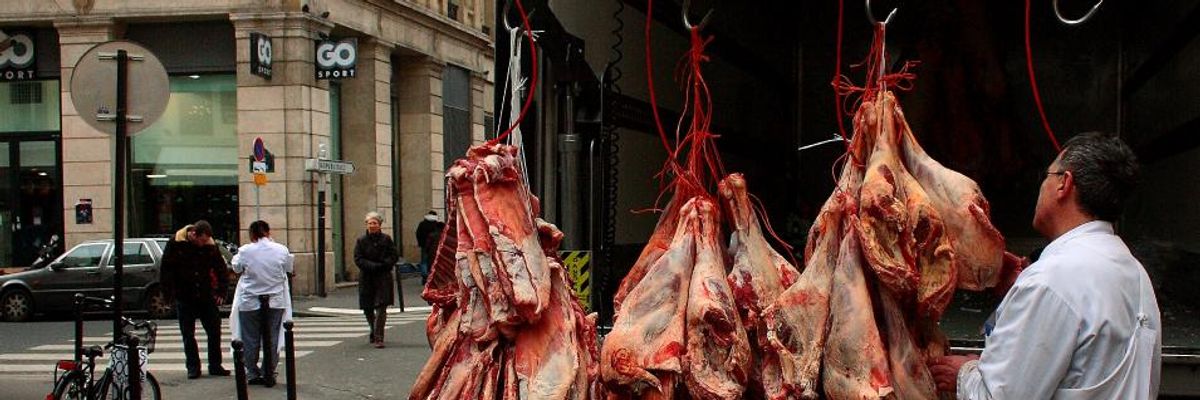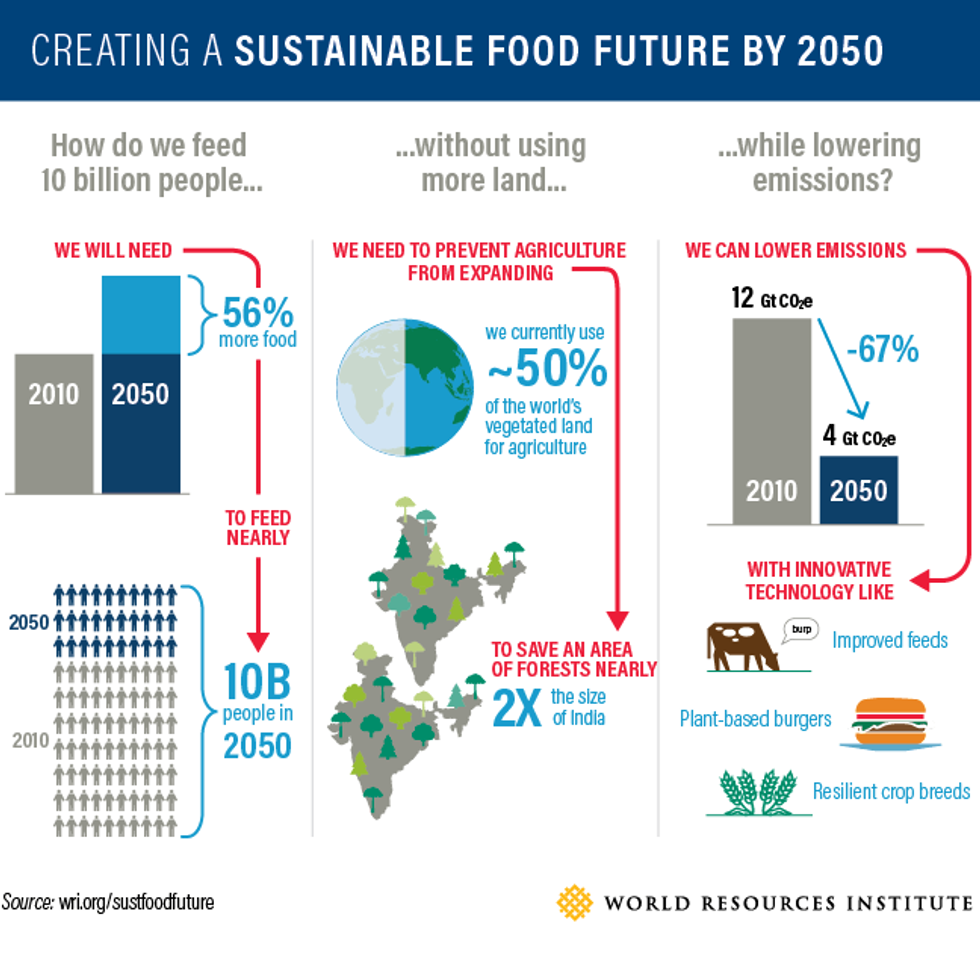

SUBSCRIBE TO OUR FREE NEWSLETTER
Daily news & progressive opinion—funded by the people, not the corporations—delivered straight to your inbox.
5
#000000
#FFFFFF
To donate by check, phone, or other method, see our More Ways to Give page.


Daily news & progressive opinion—funded by the people, not the corporations—delivered straight to your inbox.

Limits on meat-eating are among 22 proposals to curb planet-warming emissions from a new report unveiled at COP24 in Poland on Wednesday. (Photo: Evan Bench/Flickr/cc)
To feed the growing human population--projected to reach about 10 billion by 2050--while curbing planet-warming emissions to ward off climate catastrophe, people across the globe must significantly cut back on eating meat from cows, sheep, and goats, according to a new study out Wednesday.
Limits on meat-eating are among 22 proposals from the report that, if simultaneously enacted, could achieve "meeting growing demands for food, avoiding deforestation, and reforesting or restoring abandoned and unproductive land--and in ways that help stabilize the climate, promote economic development, and reduce poverty."
Unveiled at COP24 in Katowice, Poland, Creating a Sustainable Food Future (pdf) was produced by WRI in partnership with the World Bank, U.N. Environment, U.N. Development Program, and a pair of French agricultural research agencies.

Attaining a "sustainable food future," the report says, will require closing three gaps:
Regardless of which solutions are pursued to close these gaps, the need for action is apparent.
As Tim Searchinger of the WRI and Princeton University put it, "If we tried to produce all the food needed in 2050 using today's production systems, the world would have to convert most of its remaining forest, and agriculture alone would produce almost twice the emissions allowable from all human activities."
While the report suggests that 2 billion people in countries that include Brazil, Russia, and the United States cut their beef and lamb consumption by 40 percent--a lower reduction than some other studies have recommended--Searchinger told the Guardian, "We think that is a realistic goal," especially considering that "in the U.S. and Europe, beef consumption has already reduced by one-third from the 1960s until today."
The 22 proposals outlined in the report are divided into a "five-course menu":
\u201cThere is no silver bullet to achieve a #sustfoodfuture - we need to adopt all items on a five-course menu of solutions to feed 10 billion people by 2050 without destroying the world. Learn more: https://t.co/8p6dOKIHon #COP24\u201d— World Resources Inst (@World Resources Inst) 1544011812
"We have to change how we produce and consume food, not just for environmental reasons, but because this is an existential issue for humans," concluded Janet Ranganathan, report co-author and WRI's vice president for science and research.
The synthesis report mirrors previous findings, including a study published by Nature in October which called for overhauling the world's current food system by shifting toward more plant-based diets, improving technologies and management, and slashing global food waste.
Trump and Musk are on an unconstitutional rampage, aiming for virtually every corner of the federal government. These two right-wing billionaires are targeting nurses, scientists, teachers, daycare providers, judges, veterans, air traffic controllers, and nuclear safety inspectors. No one is safe. The food stamps program, Social Security, Medicare, and Medicaid are next. It’s an unprecedented disaster and a five-alarm fire, but there will be a reckoning. The people did not vote for this. The American people do not want this dystopian hellscape that hides behind claims of “efficiency.” Still, in reality, it is all a giveaway to corporate interests and the libertarian dreams of far-right oligarchs like Musk. Common Dreams is playing a vital role by reporting day and night on this orgy of corruption and greed, as well as what everyday people can do to organize and fight back. As a people-powered nonprofit news outlet, we cover issues the corporate media never will, but we can only continue with our readers’ support. |
To feed the growing human population--projected to reach about 10 billion by 2050--while curbing planet-warming emissions to ward off climate catastrophe, people across the globe must significantly cut back on eating meat from cows, sheep, and goats, according to a new study out Wednesday.
Limits on meat-eating are among 22 proposals from the report that, if simultaneously enacted, could achieve "meeting growing demands for food, avoiding deforestation, and reforesting or restoring abandoned and unproductive land--and in ways that help stabilize the climate, promote economic development, and reduce poverty."
Unveiled at COP24 in Katowice, Poland, Creating a Sustainable Food Future (pdf) was produced by WRI in partnership with the World Bank, U.N. Environment, U.N. Development Program, and a pair of French agricultural research agencies.

Attaining a "sustainable food future," the report says, will require closing three gaps:
Regardless of which solutions are pursued to close these gaps, the need for action is apparent.
As Tim Searchinger of the WRI and Princeton University put it, "If we tried to produce all the food needed in 2050 using today's production systems, the world would have to convert most of its remaining forest, and agriculture alone would produce almost twice the emissions allowable from all human activities."
While the report suggests that 2 billion people in countries that include Brazil, Russia, and the United States cut their beef and lamb consumption by 40 percent--a lower reduction than some other studies have recommended--Searchinger told the Guardian, "We think that is a realistic goal," especially considering that "in the U.S. and Europe, beef consumption has already reduced by one-third from the 1960s until today."
The 22 proposals outlined in the report are divided into a "five-course menu":
\u201cThere is no silver bullet to achieve a #sustfoodfuture - we need to adopt all items on a five-course menu of solutions to feed 10 billion people by 2050 without destroying the world. Learn more: https://t.co/8p6dOKIHon #COP24\u201d— World Resources Inst (@World Resources Inst) 1544011812
"We have to change how we produce and consume food, not just for environmental reasons, but because this is an existential issue for humans," concluded Janet Ranganathan, report co-author and WRI's vice president for science and research.
The synthesis report mirrors previous findings, including a study published by Nature in October which called for overhauling the world's current food system by shifting toward more plant-based diets, improving technologies and management, and slashing global food waste.
To feed the growing human population--projected to reach about 10 billion by 2050--while curbing planet-warming emissions to ward off climate catastrophe, people across the globe must significantly cut back on eating meat from cows, sheep, and goats, according to a new study out Wednesday.
Limits on meat-eating are among 22 proposals from the report that, if simultaneously enacted, could achieve "meeting growing demands for food, avoiding deforestation, and reforesting or restoring abandoned and unproductive land--and in ways that help stabilize the climate, promote economic development, and reduce poverty."
Unveiled at COP24 in Katowice, Poland, Creating a Sustainable Food Future (pdf) was produced by WRI in partnership with the World Bank, U.N. Environment, U.N. Development Program, and a pair of French agricultural research agencies.

Attaining a "sustainable food future," the report says, will require closing three gaps:
Regardless of which solutions are pursued to close these gaps, the need for action is apparent.
As Tim Searchinger of the WRI and Princeton University put it, "If we tried to produce all the food needed in 2050 using today's production systems, the world would have to convert most of its remaining forest, and agriculture alone would produce almost twice the emissions allowable from all human activities."
While the report suggests that 2 billion people in countries that include Brazil, Russia, and the United States cut their beef and lamb consumption by 40 percent--a lower reduction than some other studies have recommended--Searchinger told the Guardian, "We think that is a realistic goal," especially considering that "in the U.S. and Europe, beef consumption has already reduced by one-third from the 1960s until today."
The 22 proposals outlined in the report are divided into a "five-course menu":
\u201cThere is no silver bullet to achieve a #sustfoodfuture - we need to adopt all items on a five-course menu of solutions to feed 10 billion people by 2050 without destroying the world. Learn more: https://t.co/8p6dOKIHon #COP24\u201d— World Resources Inst (@World Resources Inst) 1544011812
"We have to change how we produce and consume food, not just for environmental reasons, but because this is an existential issue for humans," concluded Janet Ranganathan, report co-author and WRI's vice president for science and research.
The synthesis report mirrors previous findings, including a study published by Nature in October which called for overhauling the world's current food system by shifting toward more plant-based diets, improving technologies and management, and slashing global food waste.